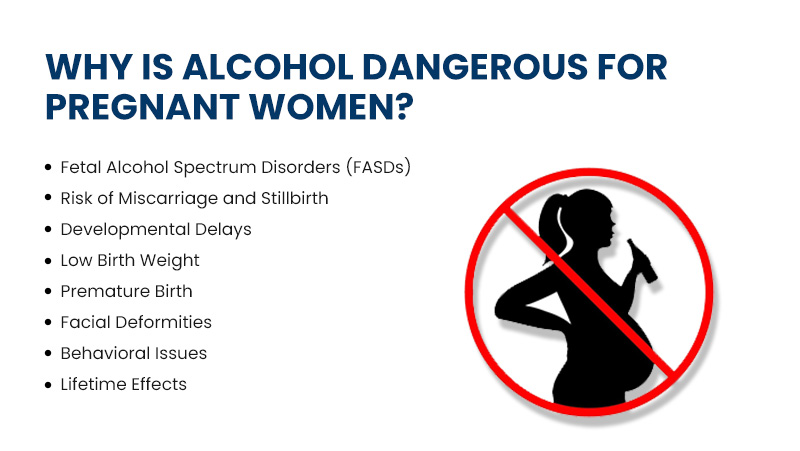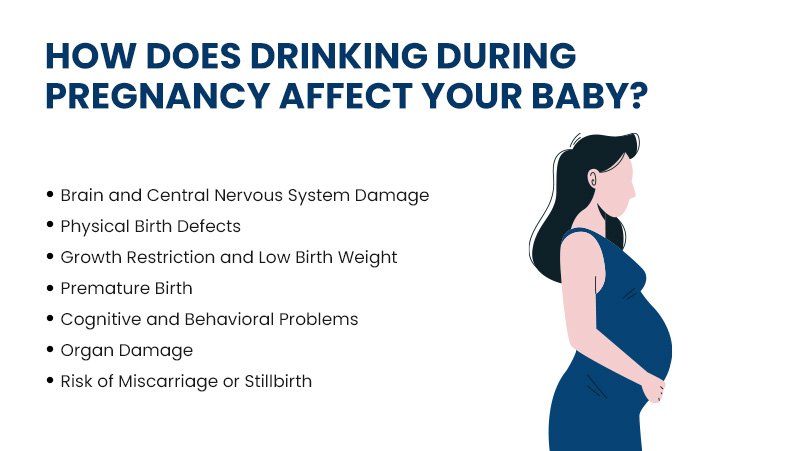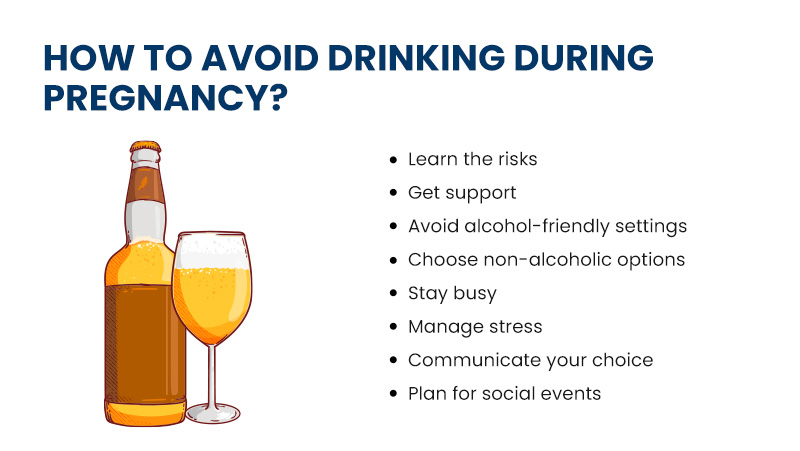Alcohol consumption during pregnancy or while attempting to conceive is not known to be safe. Additionally, there is never a safe period to drink when expecting. All wines and beers are equally dangerous when it comes to alcohol.
Any amount of alcohol used at any point during pregnancy is unsafe. It includes the initial weeks of pregnancy, during which you may not even know you are carrying a child. Beer, liquor, wine, and wine coolers are examples of alcohol.
Why is Alcohol Dangerous for Pregnant Women?
Alcohol is a dangerous substance, and it can easily pass through the placenta to the fetus, where it affects the baby's development. The development is affected because the baby's liver has not yet been formed and thus finds it difficult to metabolize and eliminate alcohol from the body. It, therefore, translates to the alcohol levels in the blood of the baby being way higher than the mother's.
One of the most familiar impacts of alcohol consumption during pregnancy is Fetal Alcohol Syndrome (FAS). FAS is a severe and lifelong condition that could trigger physical, mental, and behavioral malformations in the baby. Very unusual facial features, growth and cognitive delays, learning disabilities, and behavioral problems are just among the characteristics of children born with FAS. These could be mild or severe and have lifelong effects on the quality of the child's life.
But even if the baby does not develop FAS, alcohol will always be a threat to the health of the baby. Even in small quantities, it leads to an increase in the risks of miscarriage, stillbirth, premature birth, and low birth weight. It can, in some cases, cause the development of a condition known as Fetal Alcohol Spectrum Disorder (FASD), which entails a range of physical, behavioral, and cognitive disabilities.
The following traits and behaviors are possible in children with FASDs:
- anomalies on the face, such as a smooth ridge between the nose and upper lip
- small head size
- shorter than average height
- lightweight
- Poor synchronization
- agitated behavior
- Focusing difficulties and poor memory
- experiencing difficulties in school, especially with math learning obstacles
- Speech and language delays
- Low IQ or intellectual disability
- inadequate ability to make decisions and reason
- problems sleeping and sucking in infancy, as well as visual or hearing impairments
- problems with the heart, kidneys, or bones

How Does Drinking Alcohol During Pregnancy Affect Your Baby?
Another thing that can affect the development of a baby is alcohol consumption during pregnancy. Some people believe that taking a drink or two during pregnancy is never harmful, but the fact is that even the smallest amount of alcohol has some severe consequences for the baby.
Early birth: Two outstanding effects of alcohol intake by a woman during pregnancy are the risks of early birth, which include the fact that the baby is born before 37 weeks of pregnancy and the various health problems the baby has.
Birth Defects: Alcohol also poses another marked effect on a developing baby: an increased risk of congenital disabilities. They can vary from physical abnormalities like a cleft lip or palate to some of them even causing developmental issues like heart and brain defects. Such defects can permanently ruin a child's life, affecting their quality of life.
Heart problems, hearing loss, and cleft lip are a few of the birth abnormalities. Alcohol spectrum disorder (ASD) is when children suffer from FASDs may face a range of challenges, including developmental and intellectual disabilities.
- Stunted body growth
- Poor communicative abilities
- Impaired cognitive functions
- Routine self-care practices, including wearing clothes, food preparation, and cleaning one's teeth
- Binge drinking during pregnancy increases the risk of FASD in the unborn. For women, binge drinking is consuming four or more alcoholic beverages in less than two hours.
- LBW stands for low birth weight. A newborn with a low birth weight weighs less than five pounds, eight ounces.
- Losing your baby: A miscarriage occurs when a baby dies in the womb before 20 weeks of pregnancy.

Is It Safe to Drink Occasionally During Pregnancy?
Drinking a glass of wine or beer can seem innocuous, but it can be easily transferred from mother to child. It remains in the baby's system longer than the mother's because the baby's body is less capable of eliminating it.
Even occasional drinking may harm the baby's brain and other organs. While it is evident that binge drinking—consuming more than four drinks at once—is a risky behavior, low to moderate alcohol consumption can also be harmful to a developing fetus.
What if You Drank Before You Knew You Were Pregnant?
Don't fear too much if you drank a few beverages before discovering you have been pregnant, as this takes place often. However, the nice path of motion for the rest of your pregnancy is to abstain from alcohol.
Speak along with your health practitioner if you believe you may have a drinking problem. They should be aware of how much and when they drank alcohol for the duration of their pregnancy with the intention of better understanding the ability outcomes on the fetus. Additionally, they can assist you in deciding to give up alcohol for the gain of both you and your unborn infant.
How Much is Alcohol Safe?
There is no established "safe" level of alcohol consumption during pregnancy. Although it can be detrimental to drink alcohol at any point during pregnancy, it seems to be most harmful during the first three months of pregnancy. Beer, wine, wine coolers, and liquor are examples of alcohol.
A single drink means:
- One 12-ounce beer
- Five ounces of wine
- One and a half ounces of alcohol
Drinking frequency is less significant than drinking quantity.
- Even if you don't drink frequently, giving birth to a kid while intoxicated can be harmful.
- A baby's risk of experiencing alcohol-related harm will be significantly high when they binge drink (five or more drinks in one sitting).
- Moderate alcohol use during pregnancy increases the risk of miscarriage.
- Individuals who consume over two alcoholic beverages daily, known as heavy drinkers, are more likely to give birth to a kid who has fetal alcohol syndrome.
- The risk of injury to your unborn child increases with your alcohol consumption.
How can you keep your baby safe from alcohol during pregnancy?
Avoid drinking alcohol if you are pregnant, attempting to get pregnant, or suspect you could be pregnant. You can reduce your chance of FASDs and other health issues with pregnancy that are directly linked to alcohol consumption by abstaining from it.
Receiving routine prenatal care is crucial after becoming pregnant. Inform your healthcare practitioner as soon as possible if you require assistance quitting alcohol. The best approach to keep your unborn child safe during your pregnancy is to abstain from any alcohol consumption and, if necessary, obtain the help you need to quit.
How to Avoid Drinking During Pregnancy?
Complete abstinence from alcohol during pregnancy might not be as challenging as you would believe. Early in pregnancy, many women lose interest in drinking.
When a woman finds out she is pregnant or plans to get pregnant, she usually gives up alcohol. For the duration of their pregnancy, women who discover they are pregnant after having consumed alcohol earlier in the process should abstain from alcohol. They shouldn't worry too much, though, as there is probably little chance that consumption will affect the unborn child. Consult with a doctor or midwife if you're worried.

Final Thoughts
Alcohol consumption during pregnancy has serious consequences for the fetus's health and development. Pregnant women must avoid alcohol intake altogether to prevent fetal alcohol spectrum disorders (FASDs) and provide the best potential results for their newborns. Seeking medical advice and making good lifestyle choices can help promote a safe and healthy pregnancy for both the mother and the child.






















